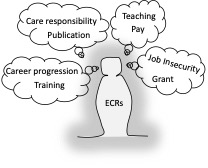If you are thinking about an alternative career it is important to spend some time reflecting why this is the case? What has brought you to the point of considering an alternative career move?
The reason that this is important is that you need to assess your skills objectively. What did you like / enjoy about your current role? What skills do you think you have? Are there any skills that you’d like to work on developing? Is there something you’d particularly love to be doing in a new role?
Of course you may already have some roles in mind that you think would be a good fit for you. If you’re not yet sure what direction to take then completing a skills audit such as https://www.ed.ac.uk/institute-academic-development/research-roles/research-only-staff/career-management/skills-audit is an excellent use of your time. It may also be useful to listen to the new micro workshop on the IAD website, ‘Career Values & Drivers’. This brief workshop will help you to reflect on your values and what you want from your working life. The recording suggests completing a brief exercise to identify your ‘career anchors’. This is a great resource which will give you an insight into how to develop your own self-knowledge and reflection as well as how to generate / garner market knowledge and understand the career planning process.
If you hope to make an informed choice about the next type of role that would be the best fit for you, be aware that Career Planning is a lengthy process and one that you need to commit to spending some time on. In order to make the best use of time it is a good idea to set some goals and action points. For example, if you have six months left on your contract then working back from that means that you need to be applying for new roles at least two months before the contract runs out. That in turn means that you have four months to decide which type of role to target and to build up some contacts in this area. In order to be successful you need to be organised.
The IAD now has a series of brief Micro workshops available on the website, which cover some of the main issues when thinking about a career change. For example, if you are sure that academia is not the career path for you but you don’t know what the alternatives might be listen to ‘Capitalise on your Research Skills to find a Career Path’. This workshop will help you to identify, which new areas you might consider targeting as well as helping you to identify the transferable skills that you have to offer. Transferable skills are of key importance in order to demonstrate that your experience is relevant in a new sector. For more insight into how to make a good match between an employer and the skills that you have listen to ‘Creating CVs for Careers beyond Academia’.
Prospects.ac.uk is a really useful starting point for identifying other job sectors and roles that might be of interest to you. You may have an industry in mind but not be sure of the types of roles available. Prospects is a great starting point but be aware that you need to broaden your research to include other sites. Professional and industry bodies can be very useful to gain an oversight of the market and key employers. Remember that there is no substitute for talking to people who are currently working in roles that interest you. Developing a network of contacts and getting introductions to new contacts to develop your contacts is key. For further information see the Handbook for Career Direction Workshop 2: Exploring Options. Conducting informational interviews with those working in different sectors can be an invaluable way of finding out more about the role, which in turn can help you decide if it’s the right one for you.
Further Resources:
1:1 Career Development Consultation – book a Consultation to speak with the IAD Careers Consultant
Platform 1 – If you are looking for a Mentor it may be useful to create a profile on Platform 1 to see if you can identify a suitable match
Linked In – Use Linked In for networking and generating new contacts
Adapting your CV for Industry – workshop recording on adapting your CV for Industry
This blog was written by Eleanor Hennige. Eleanor is the IAD’s Research Staff Careers Consultant, supporting fixed-term research staff at the University with their career planning and options. In addition to running our 1:1 appointments, she also delivers our suite of career workshops, career discussion groups and works with Schools/Research Staff Societies on career specific events and workshops. Eleanor works on a part-time basis (4 mornings a week) and can be contacted at ResearchStaff.Careers@ed.ac.uk


